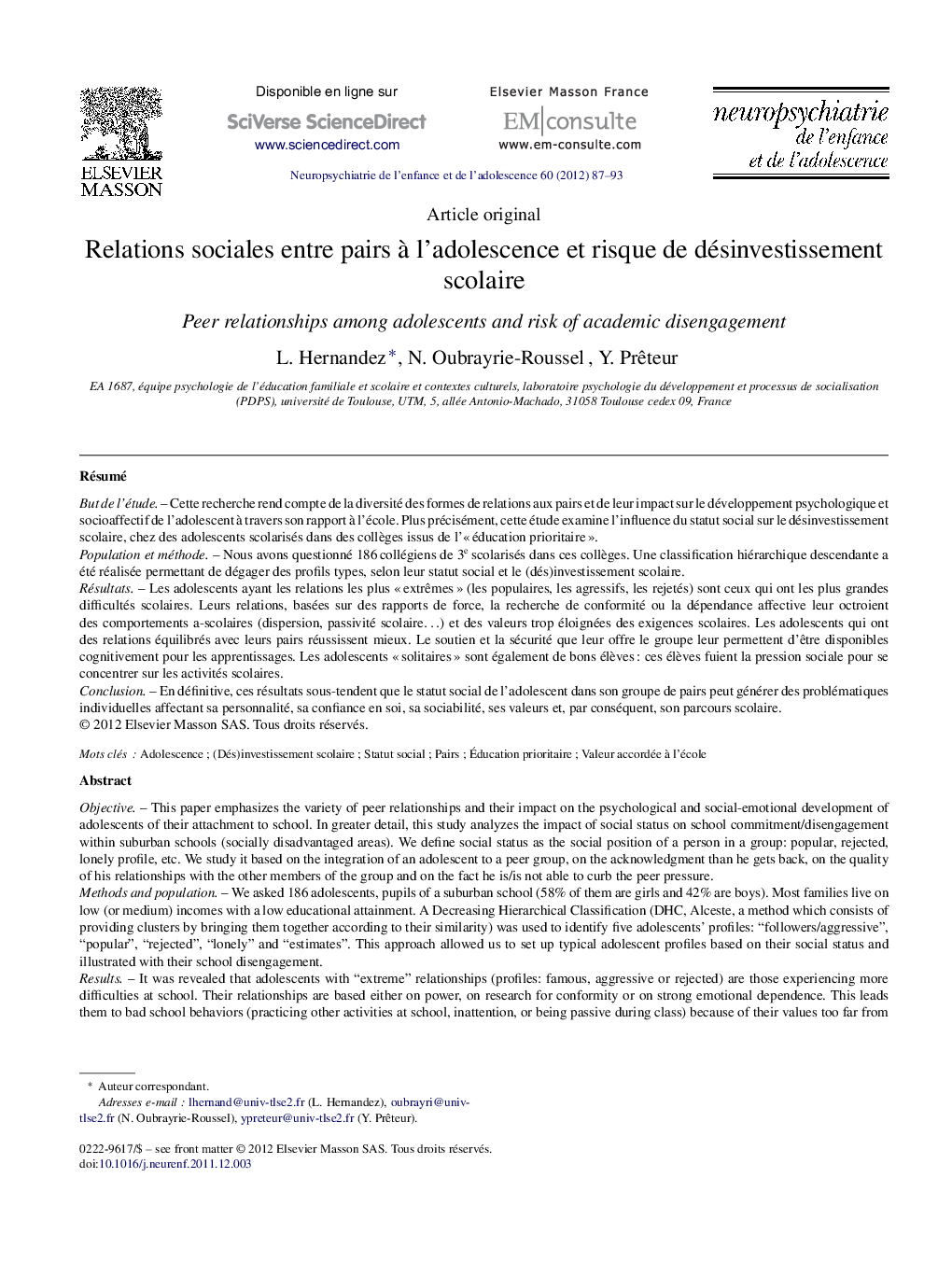| کد مقاله | کد نشریه | سال انتشار | مقاله انگلیسی | نسخه تمام متن |
|---|---|---|---|---|
| 944189 | 925586 | 2012 | 7 صفحه PDF | دانلود رایگان |

RésuméBut de l’étudeCette recherche rend compte de la diversité des formes de relations aux pairs et de leur impact sur le développement psychologique et socioaffectif de l’adolescent à travers son rapport à l’école. Plus précisément, cette étude examine l’influence du statut social sur le désinvestissement scolaire, chez des adolescents scolarisés dans des collèges issus de l’« éducation prioritaire ».Population et méthodeNous avons questionné 186 collégiens de 3e scolarisés dans ces collèges. Une classification hiérarchique descendante a été réalisée permettant de dégager des profils types, selon leur statut social et le (dés)investissement scolaire.RésultatsLes adolescents ayant les relations les plus « extrêmes » (les populaires, les agressifs, les rejetés) sont ceux qui ont les plus grandes difficultés scolaires. Leurs relations, basées sur des rapports de force, la recherche de conformité ou la dépendance affective leur octroient des comportements a-scolaires (dispersion, passivité scolaire…) et des valeurs trop éloignées des exigences scolaires. Les adolescents qui ont des relations équilibrés avec leurs pairs réussissent mieux. Le soutien et la sécurité que leur offre le groupe leur permettent d’être disponibles cognitivement pour les apprentissages. Les adolescents « solitaires » sont également de bons élèves : ces élèves fuient la pression sociale pour se concentrer sur les activités scolaires.ConclusionEn définitive, ces résultats sous-tendent que le statut social de l’adolescent dans son groupe de pairs peut générer des problématiques individuelles affectant sa personnalité, sa confiance en soi, sa sociabilité, ses valeurs et, par conséquent, son parcours scolaire.
ObjectiveThis paper emphasizes the variety of peer relationships and their impact on the psychological and social-emotional development of adolescents of their attachment to school. In greater detail, this study analyzes the impact of social status on school commitment/disengagement within suburban schools (socially disadvantaged areas). We define social status as the social position of a person in a group: popular, rejected, lonely profile, etc. We study it based on the integration of an adolescent to a peer group, on the acknowledgment than he gets back, on the quality of his relationships with the other members of the group and on the fact he is/is not able to curb the peer pressure.Methods and populationWe asked 186 adolescents, pupils of a suburban school (58% of them are girls and 42% are boys). Most families live on low (or medium) incomes with a low educational attainment. A Decreasing Hierarchical Classification (DHC, Alceste, a method which consists of providing clusters by bringing them together according to their similarity) was used to identify five adolescents’ profiles: “followers/aggressive”, “popular”, “rejected”, “lonely” and “estimates”. This approach allowed us to set up typical adolescent profiles based on their social status and illustrated with their school disengagement.ResultsIt was revealed that adolescents with “extreme” relationships (profiles: famous, aggressive or rejected) are those experiencing more difficulties at school. Their relationships are based either on power, on research for conformity or on strong emotional dependence. This leads them to bad school behaviors (practicing other activities at school, inattention, or being passive during class) because of their values too far from school requirements. Adolescents who have balanced and satisfying relationships succeed better. The support and the security from peers make them more cognitively available during class. The adolescents who do not belong to any group are also good performers: this way, they avoid social pressure so that they can concentrate on school activities.ConclusionAfter all, these results underlie that the social status of a adolescents in his group of peers can generate individual problems affecting his personality, his self-esteem, his sociability, his values and, as a consequence, his whole school journey.
Journal: Neuropsychiatrie de l'Enfance et de l'Adolescence - Volume 60, Issue 2, March 2012, Pages 87–93